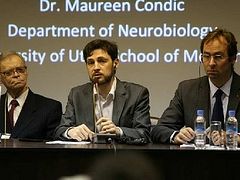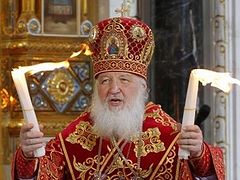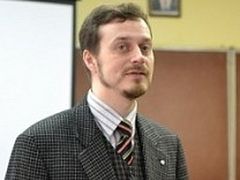Each year, in January the Orthodox Church in America commemorates the sanctity of life. This is done each year around the date of the infamous Supreme Court decision of January 22, 1973, Roe v. Wade, which legalized abortion in America. Since that time the lives of some sixty million unborn children have been sacrificed on the altar of “a woman’s right to choose.” Each year in our nation more and more citizens are rising up against this barbarism, gathering throughout the country to peacefully protest, and many bishops and priests are speaking out against the abortion holocaust in their parishes, dioceses, and publicly. This is the transcript of sermon delivered by His Grace Bp. Basil of the Diocese of Wichita and Mid-America of the Antiochian Orthodox Christian Archdiocese in North America. Bishop Basil serves as the secretary of the Assembly of Orthodox Bishops in the United States. It is a centurion call to the defense of unborn life and a model homily for clergy desirous of preaching on the sanctity of life. The audio version of this homily first appeared with the blessings of its author, Bishop Basil on Patristic Nectar Publications, and we are publishing it here again with their permission.
* * *
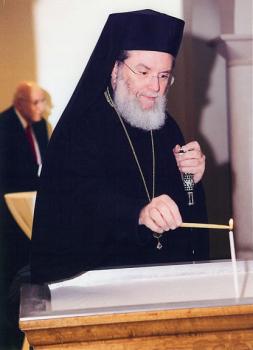 Bishop Basil (Essey)
Bishop Basil (Essey)
We heard a very brief Gospel this morning—one that’s very familiar to all of us, of Christ healing ten men who were inflicted with leprosy. And leprosy then, as it still is in many parts of the world, is not only a tragedy because of what it does physically to a person—eating away at their flesh—but more importantly what it does socially and spiritually to a person, especially then, and still in many parts of the world where they are totally removed from their communities. We all know about the leper colony in Molokai, but there were also leper colonies all over the Middle East in bible times. Lepers were put out of the villages which meant they were away from their wives or husbands, away from their children, never to see them again, except at a great distance; never to be touched by another human being again; never to be hugged; never to have a tear wiped away from their face; never to laugh with someone and slap them on the back. They were outcasts.
And our God in the flesh, Jesus, had mercy on ten men who were inflicted with this awful, awful disease. And He said, “Go, you are cleansed. Go show yourselves to the priest.” Why would you go show yourself to the priest? Because under the old law it was only the priests of the temple in Jerusalem who could declare a person clean again after having had leprosy. And that’s the only place they had priests—there weren’t Jewish priest all over the Jewish world. They were in Jerusalem at the temple—that was it. They had rabbis in their synagogues in every village, but one temple, with one priesthood. That meant that for those ten men to be reintegrated into society again, where they would no longer be cast off from society, they had to go find priests at the temple in Jerusalem, strip completely naked, stand spread-eagle and let the priests examine every square millimeter of their flesh—in their mouths, under their eyelids—every single square centimeter of flesh so that they could be pronounced clean. And if the priest found that you were indeed whole, with not one little piece of white leprous flesh, which was enough to send you back to the caves to live by yourself, he would pronounce you clean and announce that to the greater community and then you could resume your life again as a human being, living with family and hugging and kissing, enjoying interaction with people, going to the temple to pray—as a leper you couldn’t even do that.
So these ten men looked after Jesus said they were cleansed, and “Go and show yourselves to the priest.” They got so excited because they saw their leprous flesh healed at His word that they ran to find the priest. One among them—and that one was a Samaritan, and we know how those people used to look down their noses at the Samaritans for they were the dredges of society—while he was on his way to the temple remembered that he never said thank you. And he returned to Jesus and he fell at his feet and said “thank you”. And Jesus said “Where are the other nine? Weren’t ten men cleansed?” Yet only one comes back to give glory to God, and that one’s a Samaritan—the ones that everybody says are lousy folk, and impure, and they’re this and they’re that. He’s the only who had the common decency to come not only to say thank you to Jesus, the healer, but to give glory to God from Whom the healing comes.
“Thank you”—that’s important, brothers and sisters. You know, Christians ought be a thankful people, and if we’re not we’re not a Christian people. Christians are a joyful people even in concentration camps, even in prison, even in the depths of despair Christians are a joyful people, because we’re saved people. Christians in every circumstance ought to be—need to be (it defines if we’re Christian or not) a thankful people. A eucharistic people if you will. Eucharistic not meaning the Eucharist that way, but eucharistic in its literal sense, which is the Greek word for thanksgiving. If we are a eucharistic people we are a thankful people. And if we’re not a thankful people—thankful in all circumstances, not just when things go right; thankful to God first and foremost for the gift of our salvation in His Son Jesus Christ, a totally unmerited gift given to us by God; thankful that we have been called in to the communion of His holy, one holy catholic and apostolic Church; thankful that we’re born in this kind of a country, with all its flaws and scars and pimples and everything that's wrong with this country, that it’s still one of the better this world has to offer. And we ought to always be thankful for that; thankful for our families; thankful for this cathedral…
Now, having laid down that foundation of not only how important it is to be thankful, but to know that if you’re not thankful you’re not a Christian, I want to speak about something very important. We, together with hundreds of millions of others throughout the world, maybe billions, remember on this Sunday, what the world knows as “Right to Life Sunday.” It’s the Sunday nearest the anniversary of that awful decision of our Supreme Court that is euphemistically known as Roe v. Wade, which presumed that life was a right to which human beings are entitled. That’s a fallacy, brothers and sisters. There is no right to anything in this world—nothing, if we’re Christian. There’s no right to anything. You see, rights can be taken away, either full-time, like they are in many parts of this world, or in emergencies they declare martial law and certain rights are suspended.
And society here and in many other parts of the world thinks that life is a right that can be taken away like the evil one has done here, with our neighbor participating in this evil. Forty feet from where we are is the monster of America who says he’s a Christian—a murderer in the eyes of God, a murderer plain and simple. We don’t care what the Supreme Court says. No, there is no right to life. Even those who think they are defending life do life a disservice by claiming that there’s a right to life, because as I said, and as we know, every right can be suspended under certain circumstances. For believers, brothers and sisters, life is a gift. It’s a gift, not a right. It’s a gift that’s given to us. And that’s why, if you notice we don’t call it “Right to Life Sunday” in our churches. We call it the “Sacred Gift of Life Sunday.” You don’t give back a gift and still think well of yourself. Life is given to us by the Giver of Life Himself and only the gift-giver has the right to take that gift back…
And it’s not just for silly reasons to have abortions, like, it’s inconvenient, it’s a mistake. How do you tell God that that “the gift You gave me is a mistake?” That’s a judgment of God—how dare you! “It’s a mistake, its inconvenient, God keep your gift.” How arrogant! How arrogant. How ungrateful. And that’s the message of this morning’s readings—gratitude. How ungrateful.
But it’s not just fort silly, evil reasons like that. Women can be frightened into the thought of abortion—your child’s going to be born deaf, blind, terribly deformed. But we have one of the most beautiful young men who serves in this altar who should not be here today by that reasoning. The doctors frightened his mother and his father so bad saying his insides are going to be born outside. You all know who I’m talking about. All of his insides are going to be born outside they said. When he he was born he looked like a little golf ball, with his intestines in a little white membrane. One of our own, Dr. Catherine, simply put them back in, very simply. It’s simple for us to say that, but really it’s a miracle that someone could do that. His only flaw was that he wouldn’t have a belly button, but they created one for him.
Of course there are other stories, brothers and sisters, that don’t have such happy endings—we know that. But abortion and killing a child is not the answer. Murder is murder. And that’s exactly what the commandment says. It doesn’t say “Thou shalt not kill.” The original words say Thou shalt not commit murder, and that means some innocent victim some place. There’s no one more innocent than a child in the womb. We kill our own Church, brothers and sisters, every time an Orthodox woman has an abortion. Every time we deny our Church not only a member, but who knows, maybe even a saint. How dare the world say that it’s a right and then try to take that right away.
Look to that first chapter of the Gospel of Luke when the archangel Gabriel came to the Mother of God and said “Rejoice Mary, thou art full of grace, the Lord is with thee. The power of the Most High shall overshadow thee and the Son of God will take up His abode in thy womb.” That’s the feast of the Annunciation, the conception of Jesus Christ when He was a zygote. God was a zygote in His mother’s womb. And what does the Church sing? “Today is the beginning of our salvation,” simply because He was conceived! At His conception we sing “today is the beginning of our salvation.”
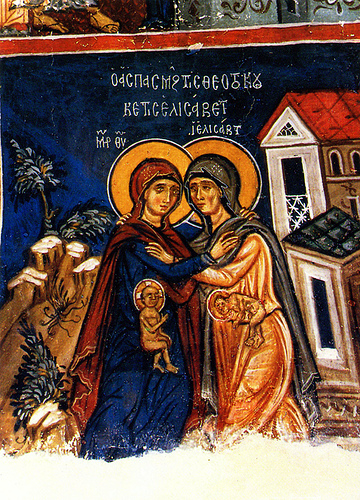
Not life, huh? Just a “mass of tissue.” And our Lord at that moment wasn’t even a mass of tissue. I don’t know how fast eggs split and multiply but He wasn’t much more than that. And already the Forerunner was fulfilling his calling as the Prophet and Forerunner, leaping in his mother’s womb, recognizing from his womb in the womb of Mary his Lord, our Lord.
Brothers and sisters, be bold for life. And not because it’s a right but because it’s a gift from God for which all we can do is say thank you. Do you know how many people in this world have to say thank you to God: “You know better than I, you’ve not given me children, but I still thank You because You know better than I.” My sister’s one. She tried everything under the sun. And there are people here in your own families and in your own congregation who would give anything to say thank you to God for that child, and others are so ungrateful, so selfish, so much wiser than God, so much more merciful than God. “I can’t let a child be born into this world with deformation.” Are you more merciful than God Who created him or her? How dare you! You know better than God? That child, no matter how deformed, deaf, blind, its insides out, everything wrong physically that we could say with it, is still a gift for which this world and the Church does give thanks.
And if you are so blessed with that kind of a child, that child will teach you humility; that child will teach you what it’s like to wash the feet of another; that child will teach you mercy, and compassion. Call it a vegetable, “what does it do for the world?” “What use is that life?” “What does it contribute to society?” It makes us a merciful society, brothers and sisters—a compassionate society. That’s what it does for us. And without people like that we become proud and self-satisfied. We become what the Nazis hoped to become—creating a perfect society where deformation was hidden away or done away with and only perfect people are allowed. Then whose feet do I wash? Who do I serve then? Where are the weak among us? Be defenders of life, brothers and sisters in all circumstances, even when it’s difficult.
Even when it’s difficult the Church never under any circumstances says that abortion is right, even for the mother's life. You who are mothers tell me you would die for your child. “He’s sick, he has a fever, he has polio—let me take it. I would die for my child.” Yet the child in the womb you won’t die for! You’re liars. You all are liars when you say that. Be thankful, brother and sisters, be thankful for God’s gift of life. It’s the most precious thing that He has given us. And if you have committed murder, if you are a woman who submitted to the knife, or if you’re a man who paid for it, who encouraged it, there is forgiveness in God. Forgiveness. Repent and have joy again. Let that be lifted. You’re going to meet the child. The child had a soul. The child is alive in Christ and you’re going to meet the child, at that great and last day. A woman confessed to me that she had an abortion. She was seventy-five and she came to me and confessed she had an abortion sixty years before. You’re going to meet the child. Repent now. And it’s possible. God is eager to do that and forgive you.
“Right to life Sunday.” I’m glad at least we have “Right to Life Sunday.” And let’s not dispute about that with those who defend life. This homily is for us in this church. Those who don’t believe in God can still be pro-life, and God bless them. And let them call it “Right to Life Sunday,” but you know and I know there’s a flaw even in that which sounds so good, and noble and holy, because rights can be suspended and rights can be taken away. Gifts can only be spurned, and that’s an ugly word. Honor the gift. Help out. We have a lot of pro-life agencies here in town because we're the abortion capital of this wonderful country. Because of that we have wonderful pro-life agencies. First and foremost on the list that came from national, Orthodox Tree House. The ministry of Renee [who runs the Witchita Tree House] and her team of life savers is listed number one. This should give us great joy.
Brothers and sisters, be thankful Scripture says in all things. In all things. Not for everything, cause as I told you that would make us masochists. We’re not asked to be fools. But no matter in what circumstance we find ourselves, there’s always reason that we can find to give thanks and to be a joyful people, because we're loved by a merciful compassionate and eager to forgive God. So if being a Samaritan means running to God and saying thank you, then I’m a Samaritan. “Thank You, God. Thank You, God, for Your Son. Thank You, God for salvation in Your Son. Thank You, God for cleansing me from my filthy, black, deep-stained sins. Thank You for making my soul at my repentance whiter than snow. You all can say thank you. Amen.

